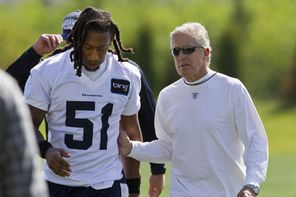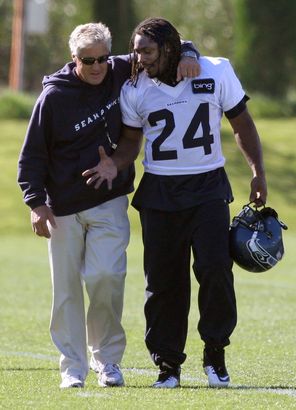Originally published January 31, 2014 at 6:17 PM | Page modified January 31, 2014 at 10:00 PM
Pete Carroll has made Seahawks better by offering second chances
Seahawks coach Pete Carroll is willing to take chances on players and coaches who others would shy away from. If you’re willing to work hard, Carroll will work with you.
/ Times staff columnist

COLUMNISTS
STORIES
![]()
NEW YORK – Michael Irvin is preaching the gospel according to Pete. The Hall of Fame wide receiver can’t stop praising Pete Carroll’s leadership style.
“He’s not just coaching X’s and O’s,” said Irvin, an NFL Network analyst. “He’s managing people.”
As a gifted athlete who has battled drug problems and legal issues throughout his life, Irvin has a special appreciation for what he considers Carroll’s greatest gift: the ability and willingness to get the best out of people who others would dismiss as too much trouble.
It is the secret ingredient to the Seahawks’ success. General manager John Schneider was able to build the league’s deepest roster because Carroll is a chameleon of a coach. He can adjust to any personality. But he specializes in dealing with — and reforming — characters alleged to have poor character.
As usual, this is Carroll seeing things differently. He looks for the best in people. He considers all challenges an opportunity to do something extraordinary. So he can interact with people on the margins — in terms of character or even talent — and cull greatness.
Consider who the Seahawks are. Their star running back, Marshawn Lynch, was breaking laws and falling out of favor in Buffalo before he was traded to Seattle. Their game-changing offensive line guru, Tom Cable, arrived with anger-management issues and assault allegations. Their starting outside linebacker, Bruce Irvin, has a criminal past.
Those are only a few prominent examples of Seahawks who might’ve been considered too problematic to give an opportunity in the past. But Schneider and his staff have a better, more nuanced way to differentiate between bad character and immaturity. And while Carroll doesn’t get through to every player, he has had far more successes than failures.
Carroll is a pro football coach, in a cutthroat business, so we’re not about to nominate him for a Nobel Prize or humanitarian of the year. This strategy is mostly about winning and building a tough team. But if you can’t appreciate that Carroll has a greater mission to improve lives, you’ll never fully understand him.
You’re talking about a man who, while coaching USC, used to walk the streets of South Central to negotiate peace in one of the world’s most notorious neighborhoods. You’re talking about the inspiration behind A Better LA and A Better Seattle, which are nonprofit organizations that aim to reduce youth and gang violence in their communities.
For Carroll, everything comes back to the way he coaches his football team. His principle belief: to help people be the best they can be. It sounds hokey until he does exactly that.
“The philosophy of the whole thing is we’re doing this one person at a time,” Carroll said. “It’s one person talking to one person and transferring a person with a vision of despair to hope. We have to help sculpt a vision for those types of people. So it isn’t so hopeless.”
To Michael Irvin, this is the best untold story in the NFL. During the buildup of Super Bowl XLVIII, the lazy narrative of villains (Seahawks) versus virtuous (Denver Broncos) has gotten media play. The Seahawks have their issues — the drug suspensions, in particular — but the bad-boy label is inaccurate and uninformed.
“We’ll slip up and focus on the few who fall off the tree and off the wagon,” Irvin said. “We’ll focus on the Brandon Browners because he’s suspended for the year, or the Richard Sherman rant and say, ‘Aw, they’re bad boys.’ But Pete Carroll has taken a lot of confused, young people who never had a father, and he gives them an opportunity by speaking to their person and bringing the best out of them in their profession.
“You’ll never hear me talking bad about people who give others like that an opportunity and a second chance because I’m one of those supposed problem people. I’ve got all the respect and love in the world for Seattle and the organization.”
Why does Carroll work so well with these flawed individuals? It’s simple, the players say. He treats them with respect. He doesn’t handle them differently.
Carroll appeals to players’ strengths, opens their eyes to the possibilities and challenges them to reach their potential.
“We like people who are real,” Bruce Irvin said. “That’s what Pete is, and we respect him and play so hard for him. I’m happy that Pete Carroll trusted in me and believed in me. He knew I had changed. How could I not want to prove him right?”
David Lujano doesn’t play for the Seahawks, but he is a part of the legacy that Carroll is creating. Lujano is an outreach worker in South King County for A Better Seattle, and he works with the YMCA’s Alive and Free, which has a partnership with ABS.
Lujano is a former gangbanger who was incarcerated for 14 years before turning around his life. He doesn’t interact with Carroll daily, but as part of a group using Carroll’s blueprint to influence change, he can tell you that the philosophy is working.
“I feel like Pete talks to people from the heart,” said Lujano, who works on Alive and Free’s warrant prevention project, which helps youths handle their legal issues properly. “For a coach that has everything, why would he spend all this effort if it wasn’t in his heart? As a person who received a second chance, I really respect that.”
Carroll has been burned before. For instance, after Browner and Walter Thurmond were hit with drug suspensions earlier this season, Carroll was blamed for the continuing problem. Carroll acknowledged the need to be better, but he refused to panic.
“Over the years, I’ve always found myself looking for guys that maybe other people don’t see something special in, and maybe we take a chance on a guy here or there that needs some extra consideration and care,” Carroll said then. “And sometimes guys, they have issues, and things pop up.”
In other words, he’s not changing his methods. No, he wants to change lives. And he desires a tough football team, which is impossible with a roster full of choir boys.
“It’s about grit to me,” Carroll said when asked for what he wants in a player. “It’s really grit. That’s what we’re looking for in guys, and that’s that competitiveness, that mentality of there’s no obstacle too big. They never give in to the thought that they can’t win.”
If you’re willing to work hard, Carroll is willing to work with you. In building a Super Bowl team with an open mind and a desire to reform, the Seahawks have made a statement bigger than football.
“In our world, what we like to do is deem someone something and then throw them away,” Michael Irvin said. “We like to say, ‘This is what he did, so that is who he is.’ And that’s not necessarily the truth. These guys understand that. Now, you’re going to have some things not work out. You might even get embarrassed a time or two. But on the majority, it has worked out. The fact that they are here, at the Super Bowl, tells you that.
“All you can say is well done.”
Jerry Brewer: 206-464-2277 or jbrewer@seattletimes.com. On Twitter @JerryBrewer










